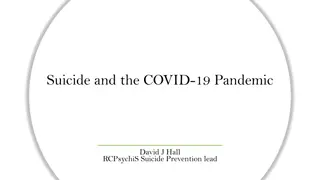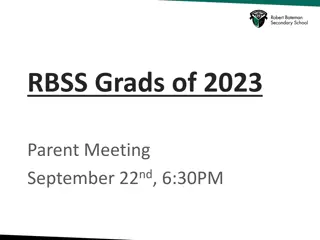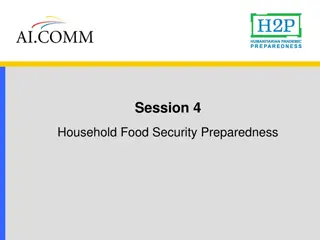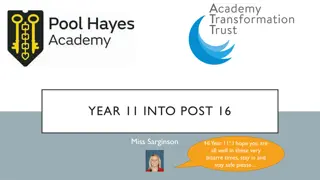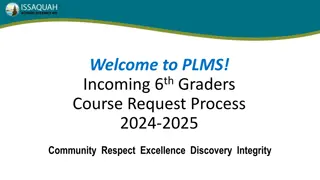Surviving Grad School During a Pandemic: Insights and Advice from a 6th Year BMB Student
Navigating the challenges of graduate school during the pandemic requires resilience and adaptability. This insightful guide by Hannah Joy Richter, a 6th-year student in the Lazar Lab at Penn, offers valuable advice on classes, lab choices, and overcoming imposter syndrome. From making the most of virtual lectures to selecting the right lab environment, this resource provides practical tips for thriving in academia.
Download Presentation

Please find below an Image/Link to download the presentation.
The content on the website is provided AS IS for your information and personal use only. It may not be sold, licensed, or shared on other websites without obtaining consent from the author.If you encounter any issues during the download, it is possible that the publisher has removed the file from their server.
You are allowed to download the files provided on this website for personal or commercial use, subject to the condition that they are used lawfully. All files are the property of their respective owners.
The content on the website is provided AS IS for your information and personal use only. It may not be sold, licensed, or shared on other websites without obtaining consent from the author.
E N D
Presentation Transcript
How to Survive Grad School Pandemic 2020 Edition Hannah Joy Richter 6thYear, BMB, Lazar Lab
Disclaimers: This year is a little different (But you know this already) Every Ph.D. journey is different You are all coming in with different expectations and experiences
Sorry theres no free food right now So here s some free advice instead
Remember why youre here Just say no to imposter syndrome You are qualified, our admissions committees don t make mistakes You are ready to tackle this next scientific endeavor You are at least a little bit passionate about science!
An outline for your first year Classes Rotations/choosing a lab Tips for the rest of grad school
Classes: how to make the most of them These are not undergrad courses; they are designed for you to learn not for you to grind and fail Attend lectures (virtually) Connect the themes to your research interests Talk to TAs Choose your optional courses wisely Note that fellowships often require transcripts but are usually happy with a mix of As and Bs
Some ideas to consider about prospective labs Field/methods: Be open to exploring new areas and learning new techniques Lab environment: Collaborative, competitive, 9am-5pm, or nights and weekends Size/age: Big/medium/small, pre-tenure/post-tenure Funding: Your stipend is guaranteed! But always talk about how the lab handles reagent requests, model organisms, number of technicians, etc. Prior trainees: How have they done and where have they gone? Publication record: Does it match your expectations of yourself?
Key questions to ask your prospective PI Are you looking to take on a thesis student? How many students will you take this year? Do you have space and money available for a Ph.D. student? NIH RePORTER (http://projectreporter.nih.gov/reporter.cfm) Will you be at Penn for the next 5-6 years? (if not tenured, or if being recruited somewhere else!) What projects are available in your lab? (Rotations/thesis) What is your mentoring style? How often do you travel normally? What are your expectations for your graduate students? What is the lab environment like? Hours, lab jobs, lab meetings? journal clubs? Can I see the lab space and meet your lab members?
How to find a mentor who will help you succeed Are your communication and work styles compatible? Emails Meeting frequency Hands-on/off Comfortable talking Mentoring style Academia or bust? Willing to talk about life or just science? Conference attendance Help networking Mentors outside of your PI Post-docs (Future) committee members Colleagues PIs at other institutions
Succeeding in your rotations Remember, a rotation is for you to learn and to evaluate the lab as much as it is for the lab to evaluate you Show up when you say you will (whether in-person or online) Write down everything Keep an up-to-date and thorough lab notebook Get to know the other members of the lab Know what you are doing and why Read the background papers! Ask questions! This is you
Time management Don t overschedule yourself (even on BlueJeans) Use a calendar! (Your choice, online/paper/what platform) It can be tough to keep track of all the meetings and seminars! Block out time for reading and studying Ask your lab mentor how long they expect experiments to take and block out a couple hours more than that Break up larger experiments into manageable blocks (this takes practice) Block out time for YOU
Data management BACK UP YOUR DATA External hard drives (if you can t afford one, talk to your rotation lab about borrowing one or your program about technology grants) Cloud storage Penn+Box (FREE!) https://www.isc.upenn.edu/pennbox Google/Apple (not free for large amounts of data) Find an organization method that works for you Talk to other grad students and post-docs about their methods (field-dependent) Don t forget to keep track of negative data (even if you re sad about it)
Keeping up with the literature Make time to read, but use that time efficiently If you get over your head in a paper, ask for help! Read abstracts/glance over figures to decide what s worth your time Use a citation/pdf manager If you thought you could get away without one in undergrad, you need one now Endnote, Papers, Mendeley, Readcube, Zotero Keep up-to-date with your chosen field PubCrawler, Google Scholar Alert, Readcube Recommendations, Twitter & other social media, BioRxiv
Fellowship applications Talk to your PIs about their expectations for your funding Training grants (T32) are a great experience talk to your programs about what ones are available for you and their requirements Individual fellowships NSF and NIH (F31/F30) and other private foundations Keep in touch with your former PIs and do a good job in your rotations! (you ll need the rec letters) Keep summaries of your undergraduate/technician/lab rotations Consider volunteering if you do not already! Keep an eye on deadlines and ask for what you need well in advance Talk to students who have applied to/gotten these fellowships
Productivity Remember you are not a machine; you are a scientist in training Set realistic expectations for yourself this takes practice Sleep, eat, exercise, relax VERY IMPORTANT If you re struggling, ask for help!
A note on finances You are salaried remember to give yourself vacations and weekends This income is entirely livable in Philadelphia but you can t go overboard on the essentials (housing, food, etc.) if you want to have fun money This is great time to make your first budget! Taxes are complicated so take a look at the info provided by BGS for last year s taxes for an example and talk to a professional (I am not a financial advisor or tax professional)
Having fun! Cobbs Creek Pets! Pizzeria Beddia
Take Home Messages Remember to ask for help Choose your mentor(s) wisely Figure out systems for time and data management Keep up with the literature Work/life balance is key - make time for yourself and friends A Ph.D. is still about learning REMEMBER TO ASK FOR HELP
Some extra resources The importance of stupidity in scientific research Martin A. Schwartz, Journal of Cell Science, 2008, 121:1771 http://jcs.biologists.org/content/121/11/1771 How to Complete and Survive a Doctoral Dissertation, Sternberg, David, N.Y.: St. Martin's Press, 1981 Getting What You Came For: The Smart Student's Guide to Earning a Master's or Ph.D., Peters, Robert L., N.Y.: Farrar, Strauss & Giroux, 1992 Graduate School: the movie Cori Bargmann, Current Biology, 1995, 5(7): 695 http://phdcomics.com/ Contact me on twitter @mdmpalindrome or by email richterh@pennmedicine.upenn.edu





